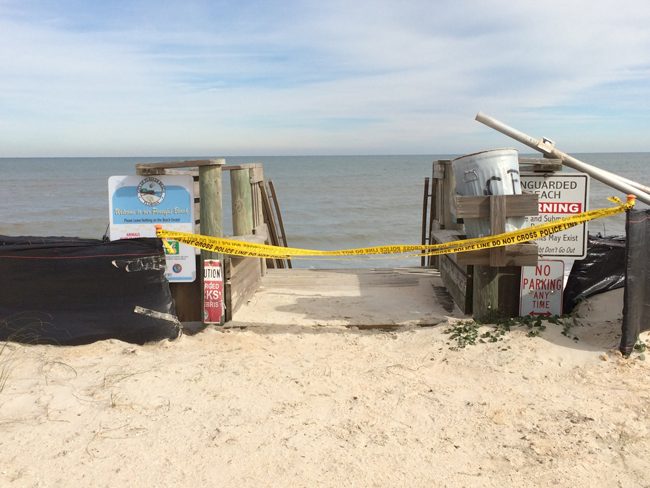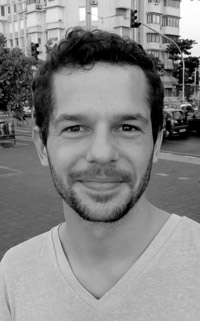
By Chad Boda
Few things in Flagler Beach are more precious, and more threatened, than the beach itself. Since the city’s founding in the early 1920s, residents and elected officials have been forced to struggle with beach erosion, much like other coastal communities around the state. Also since 1920, Florida’s population has grown by over 600 people per day, most of them crowding along the state’s beautiful shoreline. The resulting development has made coastal erosion problems more widespread, more severe and more difficult to manage.
Today, over half of Florida’s sandy beaches are considered critically eroded, including nearly 5 miles of the Flagler County coastline, mostly in Flagler Beach along south A1A. The clash between coastal communities and coastal environments has never been greater than it is today, and the question of how communities can live sustainably with the coastal environment has never been more relevant, particularly in Flagler Beach.
Residents and elected officials in Flagler Beach will have an opportunity to get a comprehensive overview and discuss the beach management problems facing their city this evening between 5:30p.m. and 7:30p.m, when the Flagler Beach City Commission will be hosting a beach management workshop at City Hall’s commission chambers.
All citizens are encouraged to participate, both to learn more about the complicated and controversial issue of erosion management facing the city, and to engage in the discussion about what actions the city can or should take to address it. Citizen participation is very important, not least because the beach is a public asset and decisions about what happens to it are fundamentally of public concern.

I’ve been working closely with the city over the last several years, undertaking both a scientific analysis of the city’s erosion problems and cooperating with city officials on enhancing local beach management practice. You can freely download the dissertation, “The Beach Beneath the Road: sustainable coastal development beyond governance and economics,” or see below.
Here is a general over-view of the workshop:
First, the workshop will kick-off with a presentation of my research process and findings. The presentation will begin with a brief historical review of the development of both Florida and Flagler Beach, focusing on how the problem of coastal management has evolved into what it is today, and what kinds of problems are particular to the local beach environment.
Second, a variety of different coastal management strategies and techniques will be presented and evaluated in terms of their adequacy for addressing the erosion problems in Flagler Beach. These different strategies include 1) local ordinances; 2) sea walls; 3) infrastructure re-location; 4) re-nourishment. The underlying logic behind each strategy will be explained and the benefits and limitations of each strategy will be clarified. Each strategy will also be related to a particular approach to “Sustainable Development.”
Third, following from this analysis of existing erosion management options, the major challenges facing the city now and in the future will be presented. These will include 1) constraints on the city’s decision making power and financial capacity to pay for erosion management; 2) short and long-term environmental planning priorities, ranging from dune vegetation planting to sea level rise; and 3) strategies for increasing citizen awareness and engagement in beach management activities. This will be followed by a 15-minute open question and answer session.
The final portion of the workshop involves a 45-minute guided discussion about the city’s future beach management priorities. The major challenges identified above will form the basis for this discussion, and a series of guiding questions will help structure the conversation and encourage the formation of practical points of action.
Public participation in the workshop is highly encouraged and all questions, comments and perspectives are most welcome. While we should not have unrealistic expectations that the workshop will resolve the erosion problem once and for all, it will provide an opportunity for bringing everyone up to date, and to begin a collective discussion about what the future of Flagler’s beach can be.
Hope to see you there.
![]()
Originally from Flagler Beach, Chad Boda in January defended his doctoral dissertation in Sustainability Science at the Lund University Center or Sustainability Studies (LUCSUS) at Lund University in Lund, Sweden in the LUCID program. Boda received his Bachelor’s degree in 2010 in Geography and Urban and Regional Planning from Florida State University and his Master’s in 2012 in Environmental Studies and Sustainability Science from the LUMES program at Lund University. Contact him by email here. See his previous contribution to FlaglerLive, “Why a Seawall in Flagler Beach Could Harm Sea Turtles and Violate the Law.”
![]()
“Chad Boda: The Beach Beneath the Road (2018)”
Click to access chad-boda-dissertation.pdf






























Richard says
More talk and no walk! Maybe one day I will own beach front property on S Daytona Ave after both the A1A and Central have washed into the ocean. HaHa!
Chris A Pickett says
I am going to make a comment that is no way meant to be interpreted as trying to be mean or nasty or non caring. Simply Realistic. Coastlines change. And there is nothing you can do to prevent it. If one builds to close to the shore, one day, maybe today, maybe 100 years from now, it may be taken by nature. I have heard many talk about how much beach was there 60 years, and that should tell you something. Coastlines change, sand moves, and life hopefully goes on. And NO amount of money thrown at it will do anything except waste that money.
Dave says
Move A1A , and restrict anyone from living or building houses on the beach front, if we act now we can save our beach but we have to remove those living too close and any roads too close
Rick Belhumeur says
I’m very disappointed that the public has been presented with a better explanation of the workshop agenda than we as commissioners have been given.
JohnX says
Chris Pickett and Chris Boda are both correct. These barrier islands are transitory. You can put up seawalls and that helps, but it is just going to go around them and come back up the other side. The ocean has been rising 2mm a year for a long, long time. As Chris Boda says: “Barrier islands are relatively unstable, or what Bellis ([90], p. 9) calls “geologically ephemeral” earth surface features, meaning they are in a state of nearly perpetual flux in geological terms. Barrier islands can prograde seaward (i.e. grow bigger), erode in place (i.e. get smaller) and migrate parallel or perpendicular to the mainland (i.e. move) depending on the variable influence of controlling factors like sediment supply or rate of sea level change, as has been and continues to be the case for Florida’s barrier island systems”
so what does that tell us? Plant grasses, encourage dunes, LIMIT DEVELOPMENT, and otherwise, FUGGEDABOUDIT
JohnX says
Nice piece of work, by the way. Strange that it is coming all the way from Sweden, but when I get the chance I am going to read it all.
John dolan esq. says
We need more people from Sweden. Wake the town and move the people.
Marlee says
Why does the County keep approving development? Are they really concerned?
Jonn says
If something was done back in 2005 these issues wouldn’t be an issue….city government should be ashamed of themselves!!
Really says
Nothing you can do about it
Dave says
What a great article btw, Chad Boda clearly knows his stuff and being that he grew up here I know he has the passion and determination to make a change.
woodchuck says
It’s all about GREED.
Wavewhisperer says
So, we blame coastal development for beach erosion, and nary a mention of the Army Corps of Engineers. I encourage every interested person to read “The Corps and the Shore” by Orin Pilkey. You’ll see who’s really to blame. What’s to be done about it? Alas, that is the question…